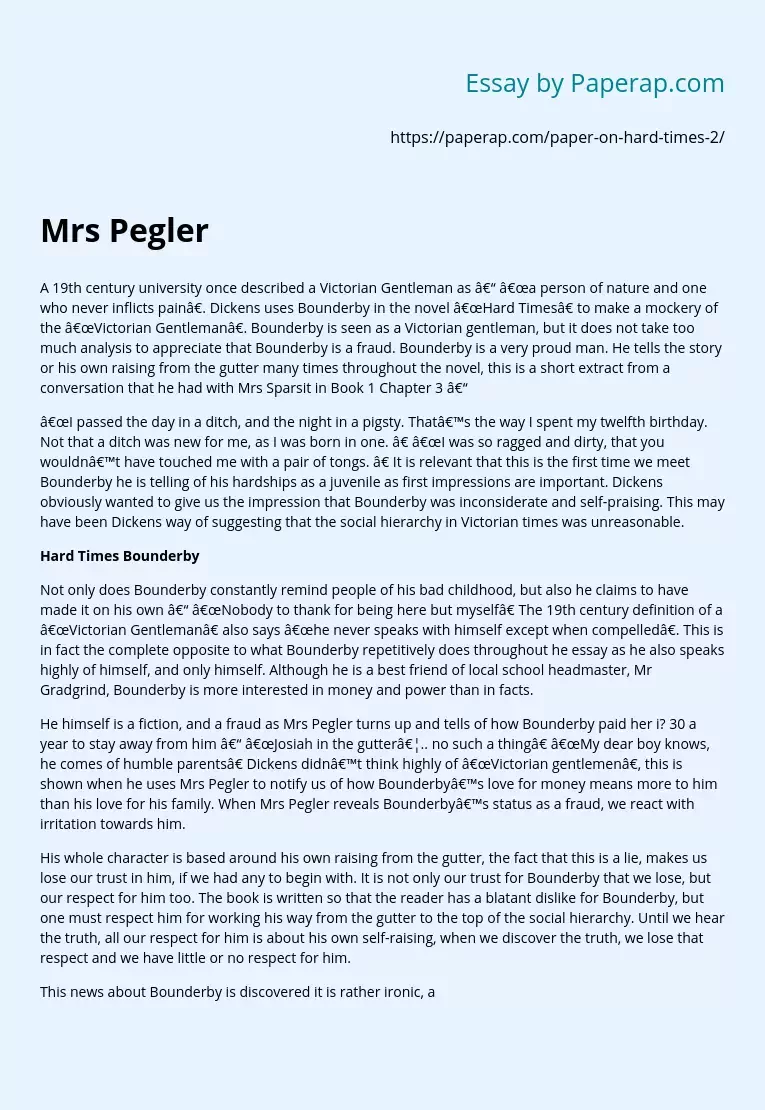Dickens' use of Bounderby.
A 19th century university once described a Victorian Gentleman as – “a person of nature and one who never inflicts pain”. Dickens uses Bounderby in the novel “Hard Times” to make a mockery of the “Victorian Gentleman”. Bounderby is seen as a Victorian gentleman, but it does not take too much analysis to appreciate that Bounderby is a fraud. Bounderby is a very proud man. He tells the story or his own raising from the gutter many times throughout the novel, this is a short extract from a conversation that he had with Mrs Sparsit in Book 1 Chapter 3 –
“I passed the day in a ditch, and the night in a pigsty.
That’s the way I spent my twelfth birthday. Not that a ditch was new for me, as I was born in one. ” “I was so ragged and dirty, that you wouldn’t have touched me with a pair of tongs. ” It is relevant that this is the first time we meet Bounderby he is telling of his hardships as a juvenile as first impressions are important.
Dickens obviously wanted to give us the impression that Bounderby was inconsiderate and self-praising. This may have been Dickens way of suggesting that the social hierarchy in Victorian times was unreasonable.
Hard Times Bounderby
Not only does Bounderby constantly remind people of his bad childhood, but also he claims to have made it on his own – “Nobody to thank for being here but myself” The 19th century definition of a “Victorian Gentleman” also says “he never speaks with himself except when compelled”.
This is in fact the complete opposite to what Bounderby repetitively does throughout he essay as he also speaks highly of himself, and only himself. Although he is a best friend of local school headmaster, Mr Gradgrind, Bounderby is more interested in money and power than in facts.
He himself is a fiction, and a fraud as Mrs Pegler turns up and tells of how Bounderby paid her i? 30 a year to stay away from him – “Josiah in the gutter….. no such a thing” “My dear boy knows, he comes of humble parents” Dickens didn’t think highly of “Victorian gentlemen”, this is shown when he uses Mrs Pegler to notify us of how Bounderby’s love for money means more to him than his love for his family. When Mrs Pegler reveals Bounderby’s status as a fraud, we react with irritation towards him.
His whole character is based around his own raising from the gutter, the fact that this is a lie, makes us lose our trust in him, if we had any to begin with. It is not only our trust for Bounderby that we lose, but our respect for him too. The book is written so that the reader has a blatant dislike for Bounderby, but one must respect him for working his way from the gutter to the top of the social hierarchy. Until we hear the truth, all our respect for him is about his own self-raising, when we discover the truth, we lose that respect and we have little or no respect for him.
This news about Bounderby is discovered it is rather ironic, as he has gone through life with his often-repeated declaration – “I am Josiah Bounderby of Coketown” This quotation shows his inflated sense of pride for the way he was raised (by himself) and for how he turned out, in other words, his wealth. Darren Cave Page 1 5/2/2007 Although as it turns out, Bounderby was not actually raised by himself from the gutter, his parents were poor but did love him. This should mean that he has sympathy for others who are like he was in his childhood.
Instead, he believes that everyman should work himself to the top, starting from the bottom, supposedly like him. This is shown in his treatment of Stephen Blackpool. Stephen comes to discuss how he could go about getting a divorce from his wife. Stephen works for Bounderby and has had a very troubled marriage as his wife is a drunken and robs him. When Stephen questions Bounderby about a divorce, Bounderby asks him if he wishes to be fed on “turtle soup and venison with a gold spoon” as he has “unreasonable aspirations for a worker”.
This amplifies the lack of sympathy and respect that Bounderby has for his workers. That comment is very sarcastic and Bounderby finds it funny. This says a lot about his character. Not only is the unsympathetic to a man with real problems, but he makes a joke of him to go with it. It seems as if Bounderby is actually shocked that a worker would ask a question like that to him because in Bounderby’s opinion the answer is so clear cut. By his sarcastic comment it is as if he is trying to say to Stephen – ‘are you trying to be funny? ‘.
Dickens' use of Bounderby.. (2019, Dec 05). Retrieved from https://paperap.com/paper-on-hard-times-2/

